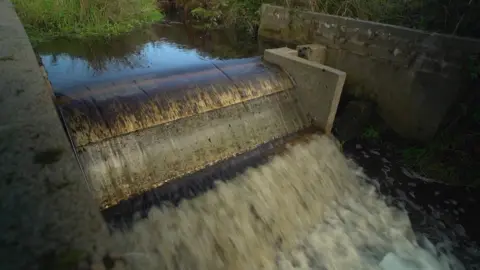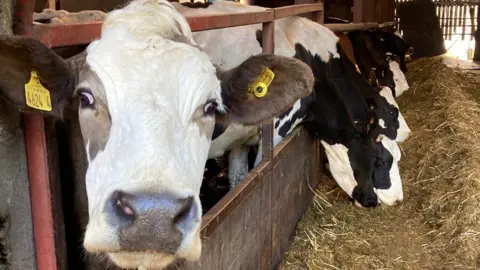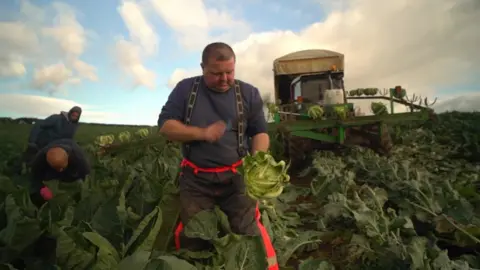NI agriculture: Is it a case of 'green' versus growth?
Agriculture in Northern Ireland feeds 10 million people across the UK.
But it's also Northern Ireland's biggest producer of greenhouse gases (GHG) - responsible for 27% of emissions.
The industry is feeling the pressure to reduce that amount, while also calling for the work it does to protect the environment to be recognised.
The land in Northern Ireland is mostly suited to raising meat and dairy, but cows produce methane in large quantities. Methane is a potent, if short-lived, GHG.
"I think we need to be given credit for what we do to sequester carbon," says Jessica Pollock.
She's a young farmer, running a dairy farm just outside Castlederg, County Tyrone.

"There's very few other industries that can sequester carbon, so I think from that perspective, yes, cows do emit a lot of methane. But we also sequester a lot of carbon, so this needs to be accounted for."
She has introduced some green measures since taking over her family farm after returning from university.
There is a robotic scraper - it helps reduce emissions from cows waste by removing it from the open air more quickly and regularly than can be done by hand.
And the farm itself is powered by a water turbine she installed, along with solar panels on the outbuildings.


All these innovations cost money.
"Making sure the farm is profitable to sustain that until that can make a profit for you is necessary," she says.
"It's very difficult to implement strategies without being profitable on farms."

But one expert says innovations are only a part of the puzzle.
"Farmers are the stewards of the land, they have particular challenges," says John Barry, professor of green economics at Queen's University Belfast.
"We're going to have to shift to where we're subsidising farmers to sequester carbon, to pay them to re-wet bogs and peatlands, and there's some experiments already going on, to plant native trees because this sucks out carbon from the atmosphere.
"This is not about reducing and destroying the beef and dairy herd, but we have to recognise the science."
Supermarket price pressures
Stephen Murdock can see the science in his fields.
He grows vegetables near Comber and is in a race to harvest his broccoli.
"We should finish cutting broccoli middle-November, but we're here just past the middle of October and all the broccoli is ready."
It's a different issue with some of the other brassicas he grows.

"The problem with cauliflowers is, between losing them in the dry weather in the summertime and the frost in the wintertime, you maybe only have 70% cut," Stephen says.
"So, with price pressure from supermarkets - quality, you know - we basically dropped the cauliflowers in the really cold weather and the really hot weather, but we're back to a 12-month programme now."
Elsewhere in his fields, the water lies - drowning cauliflowers that will go unpicked. The land is simply too boggy to get to them.
Regardless of which of the climate bills currently progressing through Stormont crosses the legislative line first, agriculture is in the crosshairs for targets to reduce the emissions it produces.
It's something Jessica has mixed feelings about.
"What is good for the environment is often good for farms too," she says.
"I do think it's very important that every farm is progressing.
"It's just at what speed and they're capability to do it with the profit margins they have."
